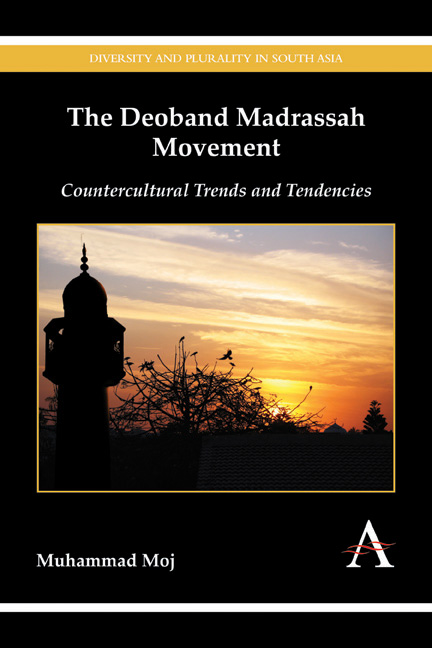Book contents
- Frontmatter
- Dedication
- Contents
- Preface
- Prologue
- Chapter 1 The Deoband Madrassah Movement: Research Context
- Chapter 2 Origin of the DMM: Seeds of a Counterculture
- Chapter 3 The DMM in United India: Activist Countercultural Trends
- Chapter 4 The DMM in Pakistan: Countercultural Politics and Extremism
- Chapter 5 Deobandi Islam: Countering Folk Islam and Popular Custom
- Chapter 6 The DMM versus Mainstream Society: Viewpoints of Deobandi Journals and Students
- Epilogue
- Appendix I The Deobandi Stance vis-à-vis Muslim Groups other than the Barelwis
- Appendix II Countercultural Exposition of the Deobandi Taliban
- Appendix III Interview Guide
- Glossary of Islamic Terms
- References
- Index
Chapter 3 - The DMM in United India: Activist Countercultural Trends
Published online by Cambridge University Press: 05 December 2015
- Frontmatter
- Dedication
- Contents
- Preface
- Prologue
- Chapter 1 The Deoband Madrassah Movement: Research Context
- Chapter 2 Origin of the DMM: Seeds of a Counterculture
- Chapter 3 The DMM in United India: Activist Countercultural Trends
- Chapter 4 The DMM in Pakistan: Countercultural Politics and Extremism
- Chapter 5 Deobandi Islam: Countering Folk Islam and Popular Custom
- Chapter 6 The DMM versus Mainstream Society: Viewpoints of Deobandi Journals and Students
- Epilogue
- Appendix I The Deobandi Stance vis-à-vis Muslim Groups other than the Barelwis
- Appendix II Countercultural Exposition of the Deobandi Taliban
- Appendix III Interview Guide
- Glossary of Islamic Terms
- References
- Index
Summary
Countercultural deviation […] is partly defined situationally and politically. The cultural blueprint of a society – smudged by much handling – is sometimes ambiguous and difficult to decipher.
Milton Yinger, Countercultures: The Promise and Peril of a World Turned Upside Down (1982, 31)This chapter discusses the circumstances under which the DMM dropped its ascetic approach in favour of activism. Under this new approach, the Deobandis established networks of darul ulum alumni in India as well as the North West Frontier Province (NWFP) and Afghanistan to revive the old dream of its predecessors to set up an Islamic state. This change of approach occurred during the first decade of the twentieth century, when the second generation of leadership took control of the movement. This chapter points out that the DMM's activism was largely displayed in politics, where it adopted a nationalist approach and hence countered the Pakistan movement, which demanded a separate state for Indian Muslims. In line with the view that a counterculture is partly defined situationally and politically (Yinger 1982, 31), this chapter focuses on the countercultural behaviour of the Deobandi movement in the political arena. The chapter also suggests that in its opposition to the idea and creation of Pakistan, the DMM was motivated inter alia by its countercultural mindset.
The DMM's transition from an ascetic to an activist mode occurred during a period marked by remarkable regional and global developments. At the time the British were reviving their ‘forward policy’ to strengthen their grip on the Indian subcontinent. At the international level, Great Britain had allied with France and Russia at the start of the twentieth century to form the Triple Entente; the Ottoman Empire was falling apart; and Egypt was under British influence, while the French had taken control of Algeria, Tunisia and Morocco. In 1910, Italy attacked Tripoli and in 1912 the Balkan states of Serbia, Bulgaria, Montenegro and Greece launched a military offensive against the Ottoman Empire, where the rebellion of the ‘Young Turks’ in 1908 had led to constitutional reforms.
- Type
- Chapter
- Information
- The Deoband Madrassah MovementCountercultural Trends and Tendencies, pp. 61 - 90Publisher: Anthem PressPrint publication year: 2015



